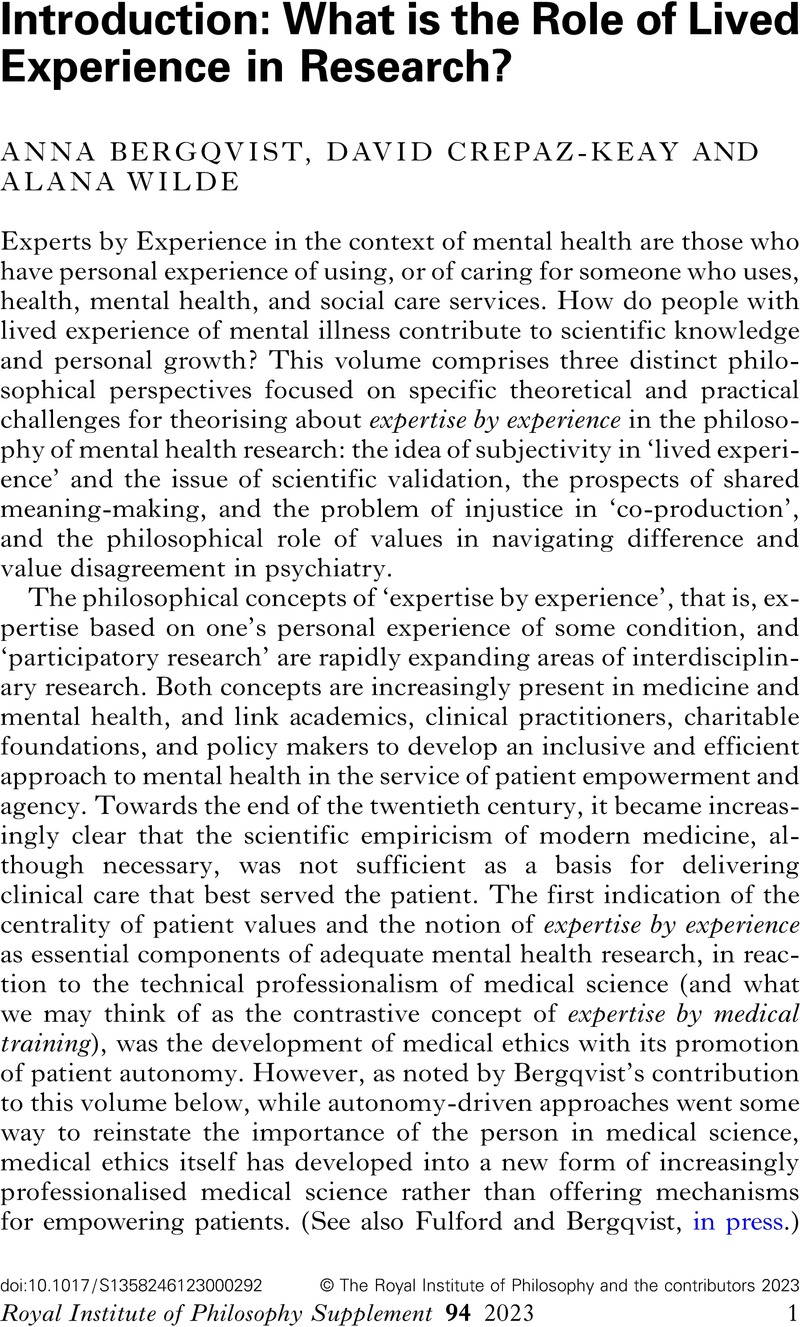No CrossRef data available.
Article contents
Introduction: What is the Role of Lived Experience in Research?
Published online by Cambridge University Press: 28 September 2023
Abstract
An abstract is not available for this content so a preview has been provided. Please use the Get access link above for information on how to access this content.

- Type
- Introduction
- Information
- Royal Institute of Philosophy Supplements , Volume 94: Lived Experience and Co-Production in Philosophy and Mental Health , October 2023 , pp. 1 - 14
- Copyright
- Copyright © The Royal Institute of Philosophy and the contributors 2023
References
Bhugra, Dinesh, Bhui, Kamaldeep, Shan Wong, Samuel Yeung, and Gilman, Stephen E., The Oxford Handbook of Public Mental Health (Oxford: Oxford University Press, 2018).10.1093/med/9780198792994.001.0001CrossRefGoogle Scholar
Collins, Patricia Hill, Black Feminist Thought: Knowledge, Consciousness, and the Politics of Empowerment (London: Routledge, 1990).Google Scholar
Harding, Sandra, The Feminist Standpoint Theory Reader: Intellectual and Political Controversies (New York: Routledge, 2004).Google Scholar
Fulford, K.W.M. (Bill), Peile, Ed, and Carrol, Heidi, Essential Values-Based Practice: Clinical Stories Linking Science with People (Cambridge: Cambridge University Press, 2012).10.1017/CBO9781139024488CrossRefGoogle Scholar
Fulford, K.W.M. (Bill) and Bergqvist, Anna, ‘The Curatorial Turn in Aesthetics as a Resource for the Contested Values at the Heart of Person-Centred Clinical Care’, in Fox, Helena, Galvin, Kathleen, Musalek, Michael, Poltrum, Martin and Saito, Yuriko (eds.), The Oxford Handbook of Mental Health and Contemporary Western Aesthetics (Oxford: Oxford University Press, in press).Google Scholar
Maj, Mario et al., ‘The Clinical Characterization of the Adult Patient with Depression Aimed at Personalization of Management’, World Psychiatry 19:3 (2020), 267–93.CrossRefGoogle ScholarPubMed
Medina, José, The Epistemology of Resistance: Gender and Racial Oppression, Epistemic Injustice, and the Social Imagination (Oxford: Oxford University Press, 2013).10.1093/acprof:oso/9780199929023.001.0001CrossRefGoogle Scholar
Rashed, Mohammed Abouelleil, Madness and the Demand for Recognition: A Philosophical Inquiry into Identity and Mental Health Activism (Oxford: Oxford University Press, 2019).CrossRefGoogle Scholar
Sadler, John Z., ‘The Psychiatric Significance of the Personal Self’, Psychiatry, 70:2 (2007), 113–29.10.1521/psyc.2007.70.2.113CrossRefGoogle ScholarPubMed
Sedgwick, Peter, Psychopolitics: Laing, Foucault, Goffman, Szasz, and the Future of Mass Psychiatry (London: Pluto Press, 1982).Google Scholar
Spelman, Elizabeth V., ‘On Treating Persons as Persons’, Ethics, 88:2 (1978), 150–61.10.1086/292066CrossRefGoogle Scholar
Tekin, Şerife, ‘Self-Concepts through the Diagnostic Looking-Glass: Narratives and Mental Disorder’, Philosophical Psychology, 24:3 (2011), 357–80.10.1080/09515089.2011.559622CrossRefGoogle Scholar
Tekin, Şerife, ‘The Missing Self in Scientific Psychiatry’, Synthese, 196:6 (2019), 2197–215.10.1007/s11229-017-1324-0CrossRefGoogle Scholar
Iain, Wilkinson, Suffering: A Sociological Introduction (Cambridge: Polity Press, 2005).Google Scholar




